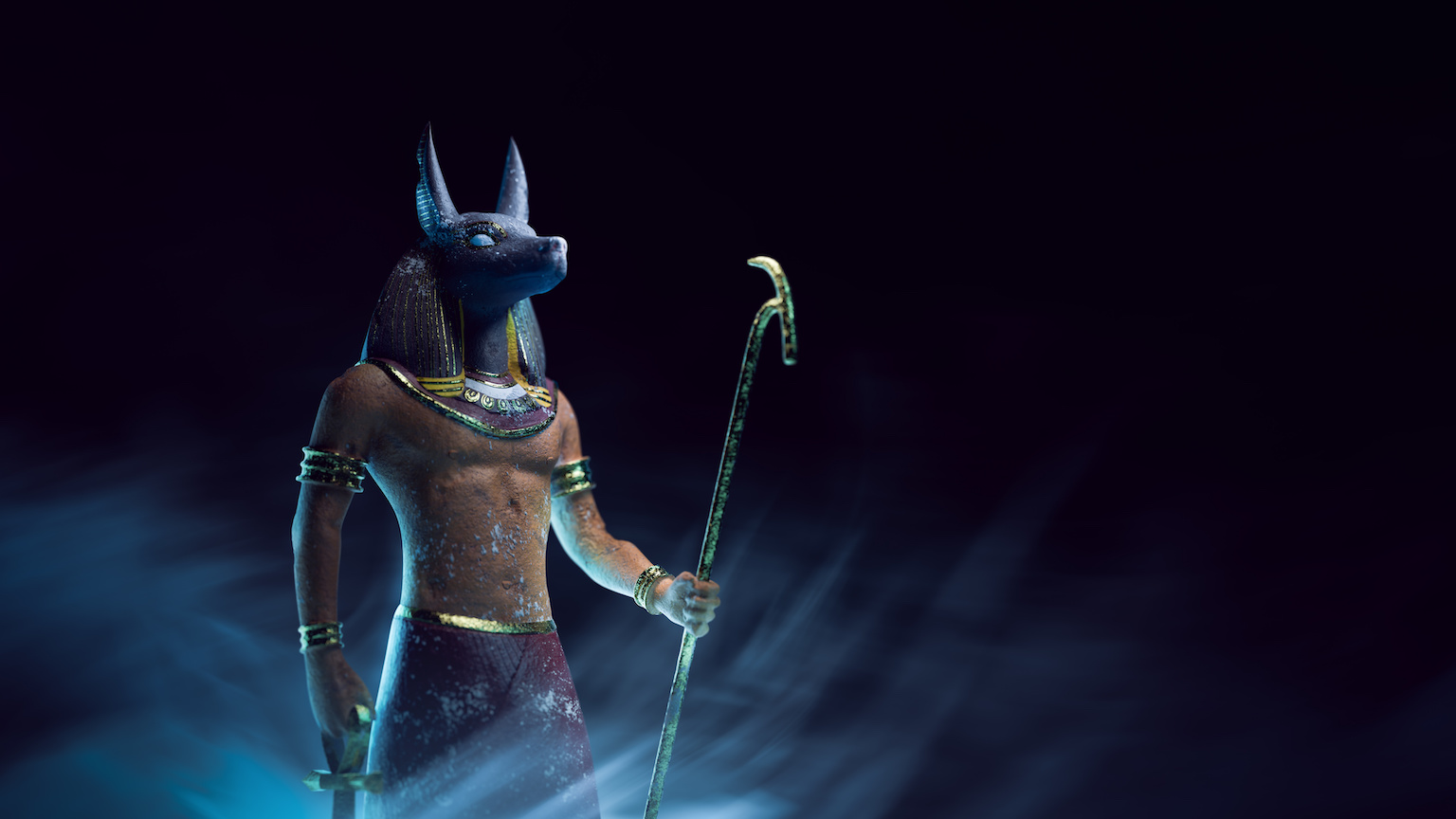Psychopomps: Gods of the liminal who wait for you when you die

- Psychopomps are deities or spirits of the liminal. They escort freshly dead souls to the afterlife.
- Most cultures throughout time had psychopomps, from the Archangel Michael who bears flaming swords, to the joking, drinking Baron Samedi. The Grim Reaper and the Valkyries are the best known.
- By giving a personality or face to Death, we can take the sting away from the terrifying unknown.
So, you’re dead. You had a good run of it — you loved, laughed, and had a few great nights out. You saw the Taj Mahal, heard the Rolling Stones live, and you managed to read the entirety of The Lord of the Rings. But, you’re dead. Don’t be too hard on yourself; it happens to the best of us. It happens to all of us.
As you lie there, cold and cadaverous on your hospital bed, or mangled and mauled by a bear, or bullet-ridden in some warzone rubble, what happens next? Imagine your spirit lifting from your body, pulled like a tissue from a box, and hovering over your still-very-handsome corpse, confused and uncertain.
“Err, hello?” your ghostly voice carries out over the greyscale and muted world. It’s the world as you remember, but it’s different. The edges of your vision are blurry, and the horizon hits a black wall or nothingness. You’re lost and you’re scared. What you need is a psychopomp.
Psychopomps show you the way
Psychopomps are guides to the afterlife. They are the myths or deities that escort the freshly deceased from this world to the next. Psychopomps are gods of the liminal, and their dominion is the shadowy borderland that bridges the living and spirit worlds. They wait for souls (sometimes they take souls) and escort them safely to where they are meant to be.
Most cultures throughout history have had their psychopomps. Sometimes, they are to be feared, such as the scythe-wielding and hooded skeleton of the Grim Reaper. Other times, they are protectors and guardians, like the Archangel Michael who bats away predatory demons with a flaming sword. Sometimes they are huge, like the giant crow-like demon, Vanth, in Etruscan mythology. And yet other times, they are tiny, like certain bees in classical mythology.
Here are five of the coolest, weirdest, and best known psychopomps throughout history.
The Aurora Borealis
If you have ever seen the Aurora Borealis — or the Northern Lights, as they’re known — then you will know that it is hard not to describe them as celestial in some way. There is a distinct otherworldliness to their ethereal glow and shimmering, shifting luminescence. This is exactly what the Cree people of North America (mostly in Canada) believe.
For the Cree, the Aurora Borealis is called Wawatay (sometimes, Wawastew), and it is made up of the departed spirits of ancestors. The eldritch colors dancing across the night sky are supposed to be phantom souls lighting the way to the afterlife. The Northern Lights are the cavorting, carousing jubilance of the dead, who aim to lure and direct freshly minted souls on their way. According to Cree belief, when we die, we must follow the beckoning lights of the Aurora Borealis and find our next life in the spirit world.
The Chinvat Bridge
Most stories of psychopomps or myths around the spirit world involve a crossing point of some kind. Often this is a river to ford — such as the Styx in Greek mythology — but in Zoroastrian belief, it is the “Chinvat Bridge”. For Zoroastrians, just after you die, your soul will hover around your body for three days. It is during this time that the gods will calculate and weigh up your good and bad deeds. It’s an infinite and divine, “Thank you for waiting, your soul is very important to us.”
On the fourth day, your soul will work its way to the Chinvat Bridge. There, waiting, is Daena. Daena will appear to you as a beautiful maiden — “who is fair from every side” — if you have lived a good life. Or, she’ll appear as a noisome hag if you’ve been bad.
Daena, and a guardian angel called Suroosh, will defend your soul from the hungry grabs of demons who seek to consume you. If your conscience has earned you heaven, Daena will escort you along the bridge to paradise. But if you have been rather more louche, she will force you to take three steps — one each for your ”evil thoughts, evil words, and evil deeds” — and you fall into hell.
Valkyries
In such a stridently martial society like the Norse, war and warriors were seen as blessed by the gods. Norse mythology is a largely apocalyptic one, where all of our various trials and tribulations are a warm up act for the great “ragnarok” battle between the gods and the forces of darkness. To be picked up by the Valkyries is not a restful, feet-up kind of deliverance. They will take you to Odin’s hall in Valhalla to prepare for war (in between bouts of mead binging). At the end of time, you will be pitched into a huge, celestial war with darkness. What happens if you survive that? Sadly, the Norse poems are silent.
Alongside the Grim Reaper, the Valkyries are likely the best known of all psychopomps. Their name means “Chooser of the Slain,” and they are the warrior women of Norse mythology who collect the brave and worthy souls of the fallen, especially those in battle.
Baron Samedi
There is no psychopomp with quite so much sartorial flair as Baron Samedi. Samedi, usually portrayed in a top hat and tails, is a hugely powerful spirit in Haitian Vodou. The Baron not only escorts the dead but is also the one who determines who dies. Baron Samedi will dig the grave for those whose time has come but is open to entreaties and votive offerings to push that time back. In his great power over the dead, he can heal and give life as well.
Samedi is often depicted as a sly, ironic, sardonic Black man (or sometimes a skeleton), who may or may not be drunk. He is a big fan of rum and cigarettes. After digging your grave, Samedi will wait for you at a crossroads (another liminal crossing point). You will chat and make fun, and if you or your family are kind to Samedi, he will stand over your corpse as long as it takes to decompose, to make sure it won’t turn into a zombie. So, you best save up some good jokes for the Baron.
The Angels of Death
There is nothing so fit-for-Hollywood as a white winged angel, brandishing aloft a flaming sword to protect the righteous souls from the fiery clutches of demons. And in both Islam and Christianity, we find two psychopomps of this kind: the Archangels Azrael and Michael, respectively.
When young children sing the old song, “Michael row the boat ashore,” they are actually chanting a folkloric homage to death. Again, we see the notion of a crossing, and in this case, the Judeo-Christian Archangel Michael takes on the role of ferryman, usually played by the Greek Charon. Michael is said to escort souls to the afterlife. There, it is Michael who holds the weighing scales that determine if a soul’s virtue is sufficient to get it into heaven or not. It is reason enough that his effigy appears across graveyards and funerary chapels all over Europe.
In Islam, Azrael is said to be the only angel bold enough to go down to Earth to face the devil and all his demons. As a reward, Allah made him the angel of death. Azrael has a register of all the names of mankind, and the righteous are circled in light, the damned in darkness. Allah will write the name of the person whose time has come to die on a leaf which flutters down to Azrael’s hand. Azrael then has 40 days in which to take that person’s life. Over the years, Islamic folklore has devised many tricks and weapons by which to keep Azrael away for just a bit longer. There is the usual prayer and petition, but also it is thought that Azrael cannot take the hand of anyone giving out alms. A useful loophole, then, is to continually give to the poor — that way Azrael must bide his time.
Journey’s end
Death is the only guarantee in life, and it is no surprise that every culture creates stories, myths, and religions around it. By giving a face and personality to Death, it takes the sting from it. The terrifying and lonely expanse of unknown waiting for us all is much more bearable if we are accompanied by a jaunty Baron or a sword-wielding guardian. These stories are meant to comfort and normalize the ubiquitous fact of dying.
Death is the ultimate moment of losing ourselves, and it is no small wonder that we would want a guide. So, choose your favorite psychopomp, make death a bit more approachable, and get ready for another amazing journey.
Jonny Thomson teaches philosophy in Oxford. He runs a popular Instagram account called Mini Philosophy (@philosophyminis). His first book is Mini Philosophy: A Small Book of Big Ideas.





